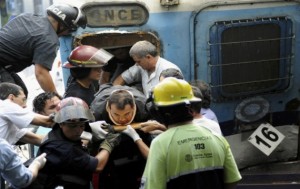By Paula Buzzi
Impunity Watch Reporter, South America
CARACAS, Venezuela — Jewish groups in Venezuela and around the world are urging President Hugo Chavez to stop using anti-Semetic attacks as a political tool against opposition leader Henrique Capriles Radonski. International groups are voicing concerns that Chavez’s campaign for presidency will only become more threatening and offensive as the October elections approach.

Last week, the government-run website of Radio Nacional de Venezuela posted a column that highlighted the Jewish ancestry of Capriles; his grandparents were Polish Holocaust survivors. The column labeled Capriles a secret follower of Zionism, which is a Jewish political movement that the column called “the most rotten sentiments represented by humanity.” The column urged Venezuelans to reject “international Zionism” by re-electing Chavez.
Abraham Foxman, the director of the New York-based Anti-Defamation League, believes Chavez’s anti-Semitic remarks are an early attempt to cast Capriles as a “traitorous Jew” who is not worthy of the presidency. “The Venezuelan political campaign has just begun, and this early appearance of government-sanctioned anti-Semitism is a deeply troubling sign of the depths that President Chavez is willing to go to retain his oppressive power,” he said.
In 2008, A U.S. State Department report named Venezuela a country where its leaders and governments “fan the flames of anti-Semitic hatred within their own societies and even beyond their borders.” The report also criticized Venezuela’s government-sponsored mass media for functioning as a medium for anti-Semitism.
Other attacks coming from the Chavez campaign include accusations that Capriles is involved in a group that promotes the “Aryan race” with ties to Nazi leader Adolf Hitler, and that he is a pig and part of South America’s bourgeoisie. “You are not going to be able to disguise yourself, even if you look for advisers, masks. Dress yourself up however you dress yourself up. Pig’s tail, pig’s ears, pig’s nose: It’s a pig,” Chavez said.
Capriles, who spent four months in jail in 2004 on charges related to an attempted coup against Chavez, has denied the accusations against him in an interview and said he wants to focus his campaign on talking about the problems that really bother Venezuelans such as crime and unemployment. “They came here and they called me ‘Nazi,’ when my grandmother was in the Warsaw Ghetto,” Capriles told The Forward newspaper in response to the accusations.
Despite the aggressive campaign against him, Capriles is currently believed to be the most popular politician in Venezuela and a strong contender against Chavez, a socialist who has ruled Venezuela for the last 13 years. Chavez and Capriles will face off in October for the Venezuelan presidency.
For further information, please see:
International Business Times – Venezuela: Hugo Chavez’ Anti-Semitic Election Campaign – 24 February 2012
Bloomberg Businessweek – Chavez Media Say Rival Capriles Backs Plots From Nazi to Zionist – 21 February 2012
ABC News – Jewish Group: Chavez Foe a Target of Anti-Semitism – 17 February 2011
CNN – Jewish Groups Decry ‘anti-Semitic’ Venezuelan State Media Article – 19 February 2012



